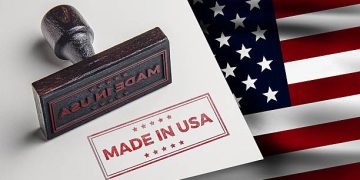White House economic advisor Kevin Hassett said Monday that recent U.S. tariff measures have not yet triggered widespread price inflation, attributing this trend to what he described as a growing willingness among Americans to buy domestically made products.
During an appearance on CNBC’s Squawk Box, Hassett commented on the impact of President Donald Trump’s protectionist trade measures, suggesting that consumer behavior has helped keep prices stable. “There’s, I think, a lot of patriotism in the data,” Hassett said when asked why tariffs have not caused a notable rise in prices, despite concerns from many economists that such policies generally lead to higher costs for consumers.
Hassett pointed to a recent White House report that indicated prices for imported goods declined between December and May. He suggested that this outcome reflects a broader shift among American consumers toward purchasing local products rather than imports. “My theory, as an economist, of why that is, is that Americans, because of President Trump’s leadership, have recognized that when they buy an American product, they not only get perhaps a better product — certainly a better product most of the time — but they’re also making their community stronger,” Hassett said.
According to Hassett, this change in consumer behavior has helped reduce demand for imported goods to a degree that has offset potential price increases from tariffs. “The bottom line is, people prefer American products,” he added. “Therefore, the demand for imports has gone way down, so much that even with what tariffs have been there, where people would say, ‘Oh, they might increase prices at least a little bit,’ we’ve seen prices going down.”
Hassett also argued that some trade partners with which the United States runs trade deficits are absorbing some of the tariff costs themselves instead of passing the additional expense onto American consumers. This, he said, further explains why the overall effect on U.S. consumer prices has been limited so far.
However, some economists remain cautious about the longer-term effects of tariffs on prices. Many analysts continue to warn that tariffs generally raise costs for importers, who may eventually pass these costs on to consumers through higher prices. Some critics have also noted that certain planned tariffs were rolled back or postponed, which may have temporarily reduced their impact on consumer prices.
Another factor cited by observers is that many businesses stockpiled goods ahead of tariff deadlines to avoid paying the higher rates immediately, which helped delay the full effect on retail prices. Ernest Tedeschi, director of economics at the Budget Lab at Yale University and a former top economist at the White House Council of Economic Advisers under President Joe Biden, said that the White House’s report might underestimate the true impact of tariffs.
Tedeschi argued that the methodology used in the White House analysis may understate the effects in their import price indices. He also cited separate data from Harvard University’s Pricing Lab, which shows that prices for certain imported goods have actually risen since early March, when new U.S. tariffs affecting trade with Canada, Mexico, and China came into effect.
While the debate continues among policymakers and economists, the administration maintains that encouraging Americans to buy local products is a key strategy in balancing trade and supporting domestic industries. Whether this approach can sustainably hold down inflation amid shifting global trade dynamics remains to be seen.
#SupplyChainNews #Tariffs #TradePolicy #EconomicUpdate #NewsUpdate















